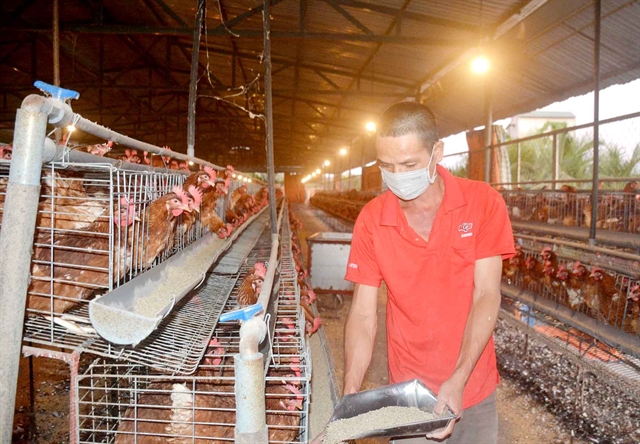 Society
Society

 |
| A chicken farm belonging to the Quân Vương Agriculture Production and Trading Co-operative in Buôn Đôn District, Đắk Lắk Province. VNA/VNS Photo Hoài Thu |
ĐẮK LẮK – Đắk Lắk Province is improving the efficiency of its co-operatives in the hope of increasing their members’ incomes.
The Tây Nguyên (Central Highlands) province is home to 727 co-operatives with 69,790 members that operate in agriculture, industry including small-scale industry, trading and services, construction, transportation, and credit.
On average, the co-operatives generate annual revenues of VNĐ1.8 billion ($76,000) and profits of VNĐ250 million ($10,600).
Members earn an average of VNĐ45 million ($1,900) a year.
The management capacities of the co-operatives have been improving in recent years, thanks to the involvement of university graduates and retired officials from organisations and enterprises.
To support the development of co-operatives, the province has taken several measures.
Its Co-operative Alliance has established exemplary agricultural co-operatives that focus on producing key agricultural products and implementing value chains.
The Fund for Co-operative Development Assistance has provided soft loans worth VNĐ21 billion ($890,000) to 38 co-operatives, including VNĐ3.5 billion ($150,000) to six co-operatives in the first half of this year.
The Fund for Employment Support has provided soft loans exceeding VNĐ1 billion ($42,300) to eight co-operatives this year.
Out of the 718 co-operatives, 501 are agricultural, making it the province with the highest number of such co-operatives in the central and Central Highlands regions.
However, only a small number of them have adopted advanced techniques for smart agriculture like automatic irrigation, drone-based pesticide spraying, solar power utilisation in agricultural production, and the use of codes for origin tracing in growing areas, according to the Co-operative Alliance.
Furthermore, digital transformation has not been widely adopted in processing products, managing operations and marketing and advertising their products.
Lê Văn Dần, deputy chairman of the Co-operative Alliance, has emphasised the importance of enhancing awareness among co-operative managers and members regarding information technology.
The alliance has suggested that the province promote the use of digital technologies for managing production, business, and services in agricultural co-operatives.
It wants the province to set up agricultural co-operatives that utilise digital technologies and subsequently expand their number.
Agriculture is the key sector in Đắk Lắk Province, primarily producing agricultural and forestry products for both domestic and export markets.
It is the largest coffee producer in the country.
The Công Bằng Ea Tu Agriculture Services Co-operative in Buôn Ma Thuột City is an exemplary co-operative that has established links between the production and consumption of agricultural products.
It has formed a partnership with Đắk Man Việt Nam Limited to secure markets for its products. Its green coffee beans have received fair trade certification from the Fair Trade Labeling Organisation International (FLO), allowing them to be exported to countries such as the UK, France, the US, and Germany.
It plans to expand its organic coffee cultivation by an additional 60ha and grow 14ha of durian this year.
It expects revenues of VNĐ12 billion ($500,000), this year an increase of VNĐ2 billion ($84,600) from the previous year.
Apart from its 49 members, the co-operative also collaborates with around 150 households for cultivating 220 hectares of crops, predominantly coffee.
Its members are 90 percent ethnic.
Huỳnh Bài, chairman of the Co-operative Alliance, has outlined plans to strengthen consulting and support activities for co-operatives.
The alliance will work in collaboration with local administrations to encourage the establishment of new co-operatives.
It will also assist co-operatives with participating in trade promotion activities, fairs and exhibitions organised in Đắk Lắk and elsewhere.
It also intends to establish a showroom in Buôn Ma Thuột City to showcase and sell products from co-operatives and co-operative groups, and, together with relevant agencies, set up similar showrooms in districts. – VNS




